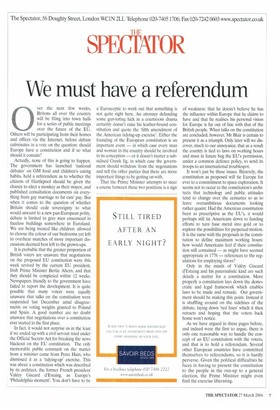We must have a referendum
0 ver the next few weeks, Britons all over the country will be filing into town halls for a series of public meetings over the future of the EU. Others will be participating from their homes and offices via the Internet, before debate culminates in a vote on the question: should Europe have a constitution and if so what should it contain?
Actually, none of this is going to happen. The government has launched 'national debates' on GM food and children's eating habits, held a referendum as to whether the citizens of Hartlepool should be given the chance to elect a monkey as their mayor, and published consultation documents on everything from gay marriage to fat cats' pay. But when it comes to the question of whether Britain should cede sovereignty to what would amount to a new pan-European polity, debate is limited to grey men ensconced in faceless buildings somewhere in Euroland. We are being treated like children: allowed to choose the colour of our bedrooms yet left to overhear snatches of more important discussions deemed best left to the grown-ups.
It is probable that the greater proportion of British voters are unaware that negotiations on the proposed EU constitution were this week revived by the current EU president, Irish Prime Minister Bertie Ahern, and that they should be completed within 12 weeks. Newspapers friendly to the government have failed to report the development. It is quite possible that many voters were equally unaware that talks on the constitution were suspended last December amid disagreements on voting weights granted to Poland and Spain. A good number are no doubt unaware that negotiations over a constitution ever started in the first place.
In fact, it would not surprise us in the least if we ended up with a civil servant tried under the Official Secrets Act for breaking the news blackout on the EU constitution. The only memorable public comment on the matter from a minister came from Peter Hain, who dismissed it as a 'tidying-up' exercise. This was about a constitution which was described by its architect, the former French president Valery Giscard d'Estaing, as Europe's 'Philadelphia moment'. You don't have to be a Eurosc,eptic to work out that something is not quite right here. An attorney defending some gun-toting hick in a courtroom drama certainly doesn't raise his leather-bound constitution and quote the 'fifth amendment of the American tidying-up exercise'. Either the founding of the European constitution is an important event — in which case every man and woman in the country should be involved in its conception — or it doesn't matter a subsidised Greek fig, in which case the government should withdraw from the negotiations and tell the other parties that there are more important things to be getting on with.
That the Prime Minister attempts to steer a course between these two positions is a sign of weakness: that he doesn't believe he has the influence within Europe that he claims to have and that he realises his personal vision for Europe is far out of line with that of the British people. When talks on the constitution are concluded, however, Mr Blair is certain to present it as a triumph. Only later will we discover, much to our annoyance, that as a result the country is tied to laws on working hours and must in future beg the EU's permission, under a common defence policy, to send its troops to an international troublespot.
It won't just be these issues. Bizarrely, the constitution as proposed will tie Europe for ever to a commitment to space exploration. It seems not to occur to the constitution's architects that technology and public attitudes tend to change over the centuries so as to leave overambitious documents looking rather quaint. Had the American constitution been as prescriptive as the EU's, it would perhaps still tie Americans down to funding efforts to turn base metal into gold or to explore the possibilities for perpetual motion. It is the same with the proposals in the constitution to define maximum working hours: how would Americans feel if their constitution still contained — as might have seemed appropriate in 1776 — references to the regulations for employing slaves?
Only in the minds of Valety Giscard d'Estaing and his paternalistic kind are such details a matter for a constitution. More properly a constitution lays down the democratic and legal framework which enables laws to be made and remade. Our government should be making this point. Instead it is shuffling around on the sidelines of the debate, laying down 'red lines' which it then retracts and hoping that the voters back home won't notice.
As we have argued in these pages before, and indeed were the first to argue, there is only one reasonable way to handle the concept of an EU constitution with the voters, and that is to hold a referendum. Several other European countries have committed themselves to referendums, so it is hardly perverse. Given the political difficulties he faces in having to present the constitution to the people in the run-up to a general election, the Prime Minister might even find the exercise liberating.


























































































 Previous page
Previous page